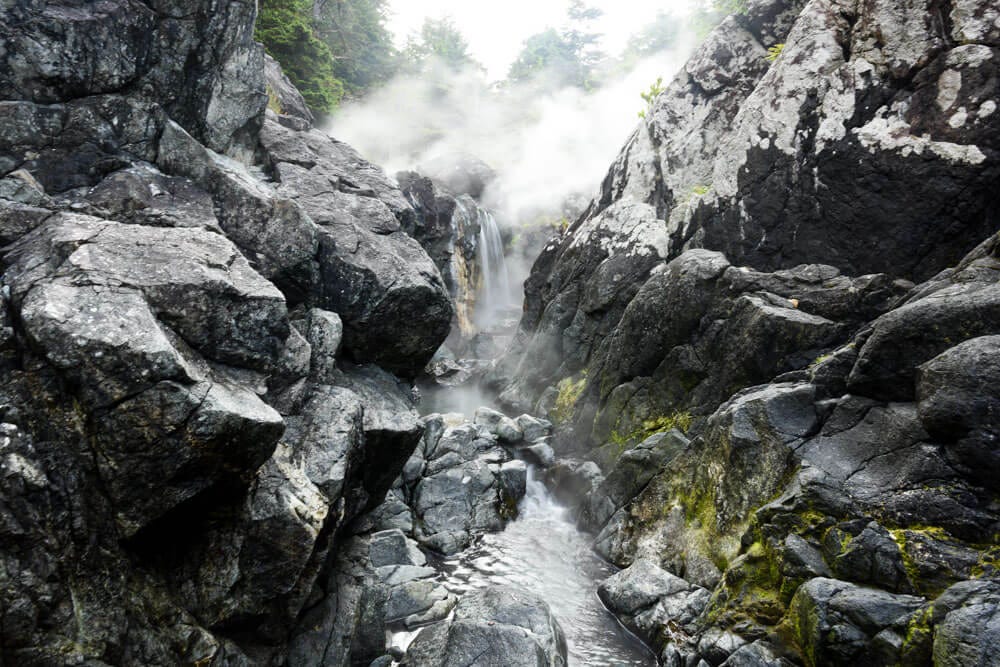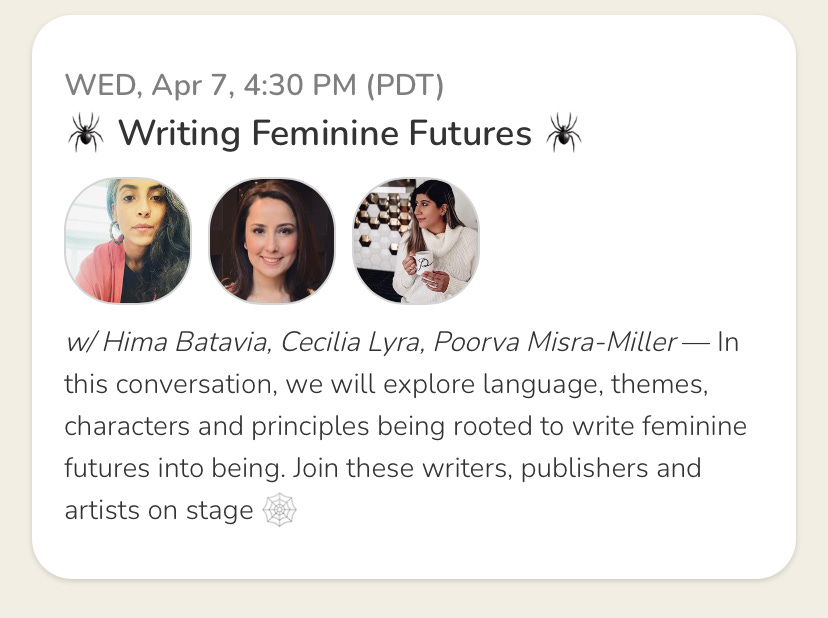
Hi! I’m Hima Batavia - a writer, cultural producer, artist, and community organizer based in T’karonto and the great infinite. This newsletter is a space to write liberated futures into being. You can learn more about me, my social location, and this newsletter here.
Two weeks ago we celebrated Ciaran’s birthday. We were staying in Low, Quebec where we had rented a cottage to live, work and sit in front of a fire for four weeks. We have been toying with the idea of moving to Quebec, and the trip was an effort to test out our hypothesis.
Low is located about an hour from Ottawa and is perfectly situated to access city life, bakery life, skiing life, hiking life, and spa life within 20-60 minutes, which bodes well for the majority of our shared needs. The trade-off for affordable proximity to outdoor living would be the distance from our community in Toronto. We figured if we made the move, it would be temporary, and perhaps a way to spend even more quality time with people we love. When the region moved into the orange zone during our trip, meaning that some non-essential businesses were opening with reduced capacity, I booked us in for a day at Spa Nordik for Ciaran’s birthday.
After I booked it, I immediately regretted it.
Over the past year of the #panini, decisions that were previously benign are now layered with safety, responsibility, solidarity, and privilege considerations. I booked on a whim and then sunk into guilt. Guilt is typically considered a futile emotion since it’s call to action is always the same: you are out of integrity, recalibrate. Yet, essentializing this emotion doesn’t seem to prevent it from colonizing your cavity. I would have to rationalize the decision — it was Ciaran’s birthday, the spa was taking precautions, we were struggling with connection, and I was slowly recovering from the burnout of the previous 5 maybe 25 years, cycling through anxiety and panic attacks in a way that I had never experienced so primitively. Maybe…we needed this? In the absence of any meaningful provincial strategies to be COVID-safe and support community mental health and wellness needs, we’ve all been left to navigate finding ways to keep our feet on the ground and heart in our bodies, lest to float away into a doorless void.
For Ciaran and I, the sauna is a major wellness ritual for us, which in Toronto given it’s not part of the culture, is still a privileged activity. Though we tend to prefer the Korean JimJimBang up in North York - a 24/7, no frills, intergenerational healing and rest community centre for $25 per person, we certainly spoil ourselves once in awhile. Oddly, the sauna brings us back into connection, since for me, the heat is an embodiment accelerator. In my body, with sweat labouring on the edge of catharsis, the swelter softening the thick air and glazing my pupils, diffusing all the stories that separate us, I feel so in love with this man. Spa Nordik is easily the ‘nicest’ spa I have been to. Aside from the variety of outdoor pools and rest areas, it has about ten different types of Finnish and Russian saunas, including an outdoor converted yurt with a light show. You can only imagine the love potential, which made things even more unfortunate when the experience went south.
Shortly after we checked in at 10:15 am, and completed a round of hot and cold plunging, regretting not bringing sunglasses to befriend the blinding light refracted on the snow, Ciaran suggested we get a coffee. We usually have one coffee a day, and that day we had yet to fulfill our quota. Technically, we should have been drinking some kind of green beverage to replenish our lost electrolytes, but it was his birthday and I obliged. One sip in, I almost puked. It may have the strongest coffee I had ever been served. Ciaran sipped to confirm, and I marched back to the barista for a solution. ‘How many shots are in this?’ I inquired. ‘About 2.5,’ he responded meekly. 'This is way too strong for me,’ I informed him. He agreed to add more water and milk to dilute the bitter brew. Even still, I could barely stomach it. Instead of abandoning the coffee, the $6 price tag irrationally kept me sipping.
Pretty quickly and severely, the spa, where we had been for a few hours, became unfamiliar to me. Catapulted out of my body and into a eerie place, the air felt colder, and the cabanas duller. My vision became vigilant, hawk-like, and I held my heart to get from one step to the next. This utopia, with artificial waterfalls pouring to relaxation music while lovers sipped martini’s in a steamy pool overlooking misty mountains, became sullen and suspect.
I looked around, now despondent with the scene that shouted blissful ignorance. ‘Is this what we want!?’ I blurted out, exasperated and breathless by now, offering no context to the existential turbulence brewing inside of me. The contrast between the pristine spa and a fractured, hurting world was all of a sudden too much to bear. Could we afford to be ignorant, even for an afternoon? Ciaran was cool as a cucumber, waiting for tacos and trying to enjoy his birthday. Quiet, he eventually responded, ‘are you always on?’
Spas in America started to become established soon after European colonialists stole natural hot springs from Indigenous communities for public bathing and socializing, adopting waters healing and restorative powers from Roman and Greek traditions. As early as the 1700s, colonialists would travel across the east coast, stopping at hot and cold springs along the way to play, be entertained, and hopefully, cure everything from cancer to gout. The American spa has since evolved into a utopic vision where peace and relaxation are short-lived, luxurious and only afforded by some. Devoid from any cultural or spiritual traditions, the spa is placeless, unburdened by the ravaging stoked by its egregious roots. In designing to be an escape, the spa acknowledges there are aspects of the colonial experience from which to escape from. When we go to a spa, we often seek the same; a break from grind and hustle, overwhelmed nuclear families and insufferable institutional gaslighting and racism.
In my caffeine-induced trance, the spa had become dystopia; a manufactured perfection that could only be promised by capitalism. The space, contained by hypnotic melodies, imported rocks and spotless stone paths, had no trace of struggle, or liberation; just a veneer of the delusion that peace could be bought.
Perhaps what is most assaulting about the spa in this moment is how much we need it to cope living in a sick and spiritually depraved system. An oppressive system unsurprisingly enduring after methodically hijacking land, bodies, stories and sovereignty, creating human shells for labour to acquire capital, and an armed force to violently guard it all.
If liberation is utopia, the spa sure ain’t it.
There is a corny quote that goes something like ‘create a life you don’t need a vacation from,’ which vaguely refers to finding and living your passion and purpose. This is a misnomer, since finding your passion does not elude one from desiring a break, a change of scenery or an adventure. The objection to a culture that necessitates a wellness escape to survive it is that what we really need is to live well. And not well like everyone has a private spa in their backyard, but well like, thriving compensation and paid sick leave, rights for undocumented workers and divestment from the carceral state. Well like community, play and imagination infrastructure, dignified housing and forest protection. Well like closing factory farms, ending pipeline projects and giving the land back. Well like protecting our elders and integrating our sacred traditions and ancient teachings into public policy. Well like eye contact, radical solidarity, spontaneous quality time and consensual hugs.
I eventually found a corner in the spa to deescalate myself, taking deep breaths for nearly an hour while sitting on a heated stone and wearing headsets pinned to the wall with four relaxation stations to choose from. Ciaran held my hand for awhile, and then left me to steam and cold plunge. This wasn’t my first rodeo. I had a pattern of dropping into the upside down at seemingly inopportune times; music festivals, concerts and club nights to name a few. The shadow of human nature has never been something I’ve feared. When Ciaran eventually returned, I had landed back into the Spa Nordik brochure.
‘I knew that coffee was too strong,’ I said when he rubbed his cheek against mine. He laughed, like a patient lover who gets it and doesn’t get it at the same time.
We probably would come back to the spa again. Perhaps it would never be the same, and perhaps I will never allow it to be an escape, but I will for sure have the green juice the next time.
Much love,
Hima
Clubhouse Conversation: Writing Feminine Futures
Last week, I kicked off my first Clubhouse conversation exploring ‘decolonizing the mind and body.’ There were so many learnings but one major takeaway is understanding that colonization is contextual, and your relationship to it depends on your positionality in a certain context. As a settler living in Canada, the primary objective of decolonization is returning stolen land to Indigenous communities, and thus should be central to any conversation. If my context changed, for instance, I moved back to India to live there long-term, decolonization would be centred in dismantling the caste system in solidarity with Dalit rights.
This week, I’ll be in conversation with Cecilia Lyra, a publisher and Poorva Misra-Miller, the founder of Women in Our Town to talk about writing feminine futures - specifically what stories, languages, themes, principles are we writing and seeing to bring feminine-centric futures into being.
Join us on Wednesday at 7:30pm and DM me if you’d like to be part of the stage conversation.





